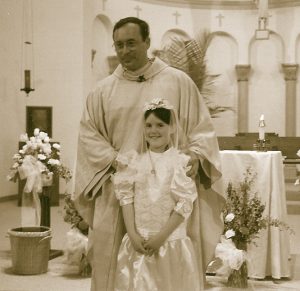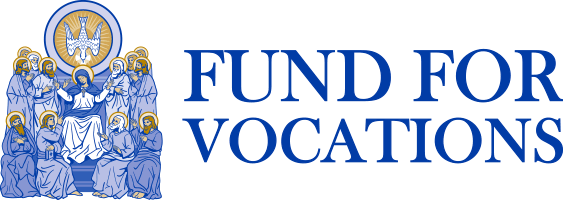No vocation happens in a vacuum; the families, especially the parents, of each young man and woman play a crucial role. We’ve written in these pages about Sister Ann Dominic (née Karen) Mahowald OP; in this issue, we’re pleased to share the experience of her parents, George and Maureen Mahowold.
What was your family’s faith life like, when your children were growing up?
George: We went to Mass, of course, and said grace at mealtimes, and our children received the sacraments. Beyond that, I also taught CCD. At some point, I had all three of my children as students in religious education, which was awkward for them! But they also saw their mother serving as cantor for many years.
Maureen: Their father project-managed the construction of a new church building for the parish. That’s not a small thing. We are not the most demonstrative people about our faith, we don’t wear it on our sleeves. But children know what’s important to you by how you allocate your time. We led by example.
Did you suspect when she was a child that Karen (as she then was) might have a vocation?
George: I think we knew before she did. She got a social-studies assignment to write a paper about a subculture, and most of her classmates chose to profile an immigrant family or something. Karen chose to write about the School Sisters of Notre Dame, a community about an hour’s drive from our home. She spent time with them to research her paper, and she loved being there and they loved having her. According to her, it was just about writing the paper, but her mother and I suspected something deeper.

What was your reaction when she told you after college that she was, in fact, discerning a religious vocation?
Maureen: We were not surprised. But at that point, we had no idea what that meant, in reality. We had no way of knowing what exactly it was going to involve.
George: As her aspirancy and formation got underway, we had to accept the conditions of the particular community she entered (the Congregation of the Sisters of St. Cecilia, a Dominican teaching order). Nashville is very far from our home. Even if it were closer, the rules are strict. We understand it: you can’t bond with your new family if your family of origin remains your priority. I was so grateful and impressed that the Dominican community in Woodbridge, Virginia, where Karen was teaching, reached out to us. They wanted to meet us, address our concerns, help us understand what we were getting into as a family. They also wanted to make sure we were on board. The parents’ reaction plays a big role in a person’s vocation, for better or worse.
Did you encounter any negative reactions from others?
Maureen: Not negative, but let’s say bewildered. And you can’t blame them. In many towns and cities in America today, it’s possible even for Catholics to go their whole lives without ever seeing a religious sister wearing a habit. I would explain that our daughter was making a choice that was a little bit like going into the military: there’s a uniform, there’s a chain of command, there are standards of conduct, there’s a boot-camp experience you have to go through. It’s not a perfect analogy, but it helped people get it. I also did some genealogical research to learn more about ancestors on both my and George’s side who had been in religious life. Karen was the first in a while, for our family, but not the first ever. That helped put it into context, too.
What was the hardest part for you, of your daughter’s vocation?
Maureen: The restricted access. We are a very close family, and not being able to see and speak to my daughter was deeply painful. It was a huge sacrifice, and it wasn’t one I chose to make; it was thrust upon me. It has gotten better with time. But dropping her off that first day in Nashville was the hardest thing I have ever done.
What has been the most joyful part?
Maureen: Seeing that she is still herself! You have no idea what is going to happen to your child once you drive away from the convent. Just seeing that she is still my baby, that she has not lost her joy or her personality. Her letters home are filled with stories about life in the convent and the joy they take in each other. It has helped me understand that maybe vocations are not so mysterious, that what we’re really talking about is maybe just a different way of living out family life. Seeing her so happy and fulfilled—that is my joy.
 What would you say to other parents whose children may be discerning a vocation? Would it be different if those parents were non-believers?
What would you say to other parents whose children may be discerning a vocation? Would it be different if those parents were non-believers?
George: Remember that everyone has his or her own path. I am one of 11 children, and all of us are completely different. Let your children go where they are supposed to go, and just keep hanging on to the love.
Maureen: Two things. First, you can’t say No to God. Or you really shouldn’t. Putting up barriers to anyone’s relationship to God, even if that person is your child, is a grave matter to be avoided. I am sure it is harder for parents who only have one child. But second, accept that even if they did not enter religious life, there would still be no guarantee of grandchildren, or of an ongoing close relationship. Broaden your circle, don’t let your child be your whole life, and don’t break ties with them even if you don’t understand their choices. Respect each other as adults.
It’s interesting that neither of you mentioned, for the non-believer parents, that maybe they could study up on the faith, try to understand their child’s choice on its own terms.
Maureen: There’s a time and a place. Especially if the parents were committed atheists, they might experience their child’s choice as a rejection of their teachings or even of them. They would surely be confused, hurt, and angry. That moment of first getting the news of a vocation might not be the optimal moment for overt evangelization, but just for listening and loving encouragement.
The costs of college have gotten completely insane. Based on the experiences of Sister Ann Dominic and your other two children, what advice would you give to someone graduating high school today? Would that advice be different if you knew he or she would be entering religious life?
George: There’s just no one-size-fits-all response. It’s hard to give advice when you have no idea what direction they will pursue—and they don’t know either. I will say that Catholic University of America was not our choice for Sister Ann Dominic: it was hundreds of miles farther from home and a lot more expensive than other options. But the people and the environment at CUA played a big role in inspiring her vocation. There’s no doubt about that.
Your entire family, friends, and home parish pitched in to help get Sister’s loans paid off so she could enter. What was that experience like?
Maureen: It was beautiful. People held bake sales, made personal donations via her go-fund-me page, contributed in-kind donations. Her older sister bought a new car and let Karen have the old one so she could get to work. Her aunt and uncle let her move into their house rent-free. Everyone helped however they could. The fact remains, though, that she simply could not have entered formation without the MEFV. The bake sales had powerful secondary effects of community solidarity and effective witness, but the actual financial returns were a tiny fraction of the debt load.
What would you say to the MEFV supporters? What did its support of Sister Ann Dominic’s vocation mean for you, as her parents?
George: Well, we would say “thank you,” first of all!
Maureen: MEFV was the difference between her being able to enter or not. Her vocation might have been lost completely; at a minimum, it would have been delayed for many years. I’d like the supporters to know what an important thing they are doing for the church. People don’t realize that vocations are still happening because we never hear about them: I read our diocesan newsletter but we don’t get news about vocations. Then we read the MEFV newsletter and we learn so much about the different orders, and their charisms and histories and, yes, the vocations they are producing. It’s beautiful. Your supporters help make vocations possible, and also help the lay faithful know that vocations still happen. •
